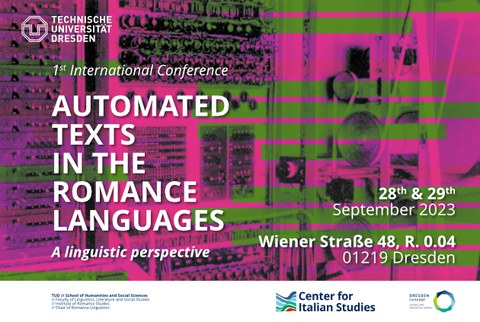Apr 16, 2023
Call for abstracts - 1st International Conference on “Automated texts In the ROMance languages” (Ai-ROM), TU Dresden, 28-29 September 2023
1st International Conference on “Automated texts In the ROMance languages” (Ai-ROM), TU Dresden, 28-29 September 2023 – CFA
Organization: Chair of Romance Linguistics (French-Italian), Institute of Romance Studies,
Prof. Dr. Anna-Maria De Cesare, Dr. Stefan Koch, M.A. Tom Weidensdorfer,M.A. Michela Gargiulo, M.A. Claudia Rausch
Automated texts belong to a rapidly evolving field and have a high degree of disruptive power. From a technical standpoint, they are generated with new and increasingly sophisticated techniques, involving the use of algorithms and (soft) artificial intelligence. From a communicative perspective, they are in the process of revolutionizing the way texts are conceived, produced, distributed, and consumed. As they grow in number, improve in quality, and expand in variety, automated texts are set to become an important part of our lives over the next decade.
The 1st Ai-ROM Conference aims at bringing together researchers from all areas of Romance Linguistics and neighboring fields (Communication Science, Media and Journalism Studies, Computational Linguistics) to reflect on automated texts from a variety of perspectives: theoretical, descriptive, and practical. We understand ‘automated texts’ in a broad sense, including formats as diverse as texts generated by AI-powered smart agents, informally called “chatbots”, producing both written and/or oral outputs (e.g., ChatGPT, as well as “virtual assistants” such as Alexa, Siri etc.), template-based automated texts (A.I. Anchor, Gabriele, Tobi) automated neural machine translations (produced by DeepL, Google Translate etc.), and texts generated by writing assistants (e.g., rytr.me).
We welcome abstracts on single Romance languages and varieties, on comparisons between Romance languages or between Romance and Germanic languages. The conference is open to all theoretical and methodological approaches. Special interest lies in corpus-based and corpus-driven analyses as well as qualitative and quantitative analyses. Papers presented at the conference will be published in a special issue of an international journal (TBA).
Topics of interest for the Ai-ROM conference include but are not limited to:
- Taxonomies of automated texts, reflections on category boundaries and hybrid forms
- Comparisons between automated and human language (written, oral, hybrid)
- Linguistic features of automated texts (i.e., lexical, morphological, syntactic)
- Graphic properties of automated texts (e.g., punctuation, emoji, emoticons)
- Linguistic expression of stereotypes as well as gender, race, age, and other forms of biases
- Textual properties of automated texts (nature of textual units, cohesive markers, thematic progression, implicit communication, authorship etc.)
- Text automation and information packaging
- Pragmatic and discursive properties of automated texts
- Challenges and opportunities of text automation for teaching and learning practices
- Challenges and opportunities of automated texts for smaller Romance varieties
Abstract submission and notification of acceptance
If you are interested in participating in the conference, please submit your abstract (in English or a Romance language: Italian, French, Spanish, Portuguese) by April 15, 2023 to . The abstract must be anonymous and include between 400 and 500 words (references excluded). It must provide information on the language(s) considered, the phenomenon analyzed, the data used and the method of investigation. It should also indicate some (provisional) results.
The Scientific Committee will announce acceptance / rejection of proposals by April 30, 2023.

